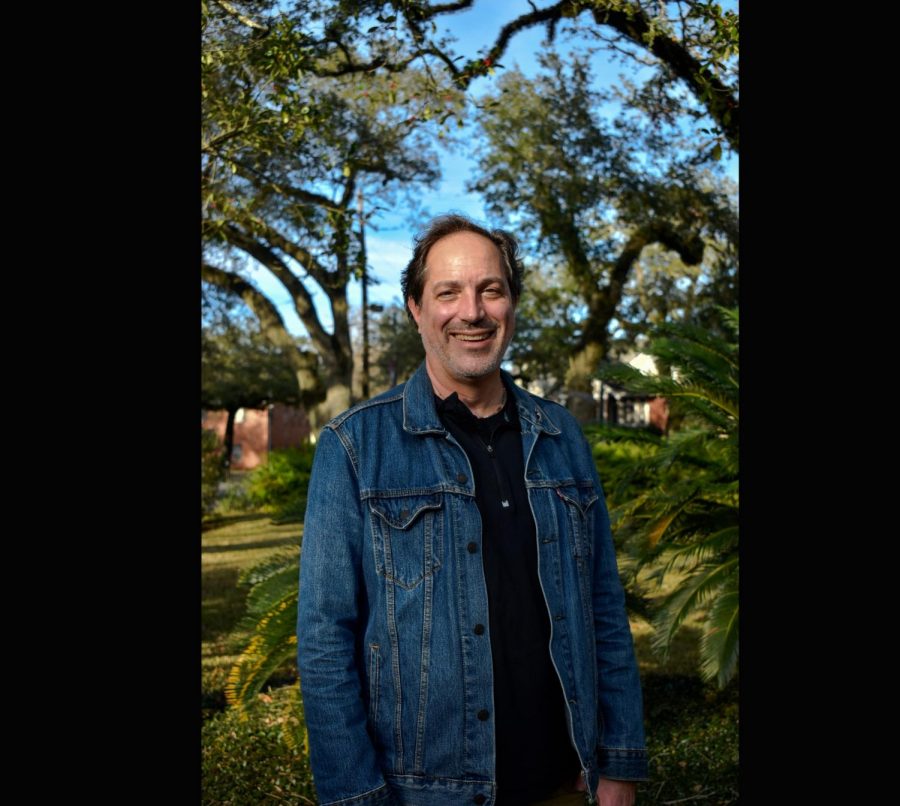Loyola law professor named to climate emissions task force
Professor Robert Verchick was appointed to the new Climate Emissions Task Force by Gov. Edwards. He has worked in enviornmental law for decades and is currently a law school professor. Maria Paula Marino / The Maroon Photo credit: Maria Paula Marino
February 13, 2021
Loyola Law school professor, Robert Verchick, who worked in the Environmental Protection Agency under the Obama Administration and has conducted research abroad in India, is now onto his next project, representing Loyola in Louisiana’s effort to protect the planet.
Louisiana State Governor John Bel Edwards appointed Verchick to the state’s new Climate Emissions Task Force, the first of its kind in the Gulf South. The task force aims to cut the state’s net greenhouse gas emissions, as well as aid in adjusting to climate change.
Verchick, Gauthier-St. Martin eminent scholar and chair in environmental law at Loyola’s college of law, has worked in environmental policy and law for decades. Verchick also directs the university’s Center for Environmental Law and Land Use, which focuses on responding to the Gulf Coast’s unique environmental challenges. As a member of Louisiana’s new climate emissions task force, he will help with the group’s goal of reducing net greenhouse gas emissions by 100% by 2050, with incremental goals of 26-28% by 2025 and 40-50% by 2030.
The task force is comprised of six working groups, designed to represent various sectors of the economy and four advisory groups that focus on equity, law and policy, financial and economic concerns, and science.
Gov. Edwards announced the task force in gubernatorial Executive Order 2020-18, which outlined the plans to reduce Louisiana’s role in global climate change. The task force plans to balance Louisiana’s strong industrial and energy economies while also saving the fragile swampland.
“By engaging stakeholders from all sides of this issue in the development of these policies, we will take a comprehensive look at how to best meet the challenges of the future,” Edwards said in a press release.
Apart from reducing the state’s net carbon emissions, the task force is also concerned with ensuring that Louisiana is a part of an everchanging, modern society, according to Verchick. Verichick said the climate change adaptation projects are important for the success of the state’s economy as the U.S. turns to more green sources of energy.
“The most valuable infrastructure that we have is the natural infrastructure… if we don’t put it on our balance sheets somewhere, then we’re going to lose it all, and then we’re going to be stuck,” Verchick said.
While the task force’s primary goal is reducing greenhouse gas emissions in an effort to become a more environmentally friendly economy, it also plans to support Louisiana’s extensive fossil fuel industry and employees, according to Verchick. He said that as Louisiana implements new technology and transitions to a modern, greener economy, employment opportunities will rise.
The task force ultimately has one main objective, which Verchick described as bringing the state’s economic and environmental wellbeing into a green society.
“If you want a functioning economy and a functioning democracy, everything you do has to be geared to making sure that people have a way to make a living and people have a way to be safe and healthy,” Verchick said.
Louisiana’s unique environment, rich with swamplands, beaches and offshore drilling locations, makes it an incredible location to experiment with and implement new technology, according to Verchick. Members of the task force are discussing other projects as well, such as exploring offshore wind power, addressing environmental racism and advocating for preservation of the swamplands.
Verchick’s experience working all around the world in a variety of environments has set him up for this project. Verchick served as senior fellow at Tulane University’s Disaster Resilience Leadership Academy and President of the Center for Progressive Reform. He has experience in federal environmental policy writing, serving on climate task forces and conducting research internationally.
“We talk a lot about reducing carbon and a lot about climate change, but beyond that, these are issues that are important to real people’s lives now,” Verchick said.








